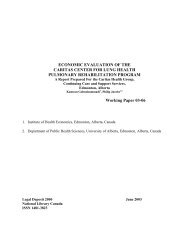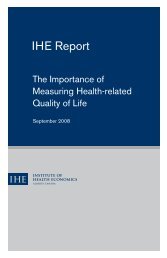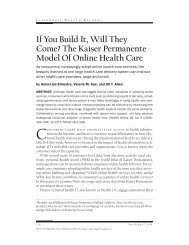Bariatric treatments for adult obesity - Institute of Health Economics
Bariatric treatments for adult obesity - Institute of Health Economics
Bariatric treatments for adult obesity - Institute of Health Economics
- No tags were found...
You also want an ePaper? Increase the reach of your titles
YUMPU automatically turns print PDFs into web optimized ePapers that Google loves.
The investigators pointed out that the effects <strong>of</strong> weight loss on mortality rate cannot be evaluatedseparately within the two study groups, given the limits <strong>of</strong> the study’s statistical power. There<strong>for</strong>e, itcannot be determined whether the favourable survival effect <strong>of</strong> bariatric surgery is explained byweight loss or by other beneficial effects <strong>of</strong> the surgical procedures.Findings from other SRs that assessed multiple treatment strategiesOne comprehensive systematic review/HTA, 2 published in 2004, assessed the evidence on the safetyand efficacy/effectiveness <strong>of</strong> various bariatric treatment strategies—including dietary therapy,exercise, behavioural therapy, pharmacotherapy, and surgery—in patients with a BMI <strong>of</strong> 28 kg/m 2or greater. A number <strong>of</strong> articles have been published on different outcomes from this review; theseare listed in the exclusion table in Appendix T.B. The results from the original review that assessed84 RCTs are briefly summarized below.Weight loss, risk factors/comorbiditiesDietary therapyLow-fat diets (which included 600 kcal/day deficit diets) were associated with the prevention <strong>of</strong> type2 diabetes and improved control <strong>of</strong> hypertension. These diets were associated with a weight loss <strong>of</strong>approximately 5 kilograms after 12 months and an improvement in risk factors, with weight losscontinuing <strong>for</strong> 3 years. Insufficient evidence was available to assess the putative benefits <strong>of</strong> lowcalorieor very-low-calorie diets.Adding physical exercise to dietary therapyThe addition <strong>of</strong> an exercise program to dietary therapy was associated with improved weight lossand risk factors <strong>for</strong> at least 1 year. Studies that combined low-fat diets and exercise, with or withoutbehavioural therapy, suggested improved control <strong>of</strong> hypertension and type 2 diabetes.Adding behavioural therapy to dietary therapyThe addition <strong>of</strong> a behavioural therapy program to dietary therapy was also associated with improvedweight loss <strong>for</strong> at least one year.Adding exercise and behavioural therapy to dietary therapyIt was unclear whether both exercise and behavioural therapy together further enhanced the effect<strong>of</strong> dietary therapy.Adding medications to dietary therapyUse <strong>of</strong> orlistat was associated with a weight loss <strong>of</strong> approximately 3 kilograms after 2 years, and withbeneficial changes in risk factors. Sibutramine was associated with a weight loss <strong>of</strong> 3 kilograms after18 months <strong>for</strong> people on a maintenance diet and with beneficial changes in risk factors except <strong>for</strong>diastolic blood pressure.In addition to the RCTs on short-term outcomes, this review also included 37 observational studies<strong>for</strong> long-term outcomes.MortalityFor women with <strong>obesity</strong>-related comorbidities, intentional weight loss, irrespective <strong>of</strong> the amount <strong>of</strong>weight lost, was associated with risk reduction <strong>of</strong> death, death from cardiovascular disease, cancer,<strong>Bariatric</strong> <strong>treatments</strong> <strong>for</strong> <strong>adult</strong> <strong>obesity</strong> 92
















